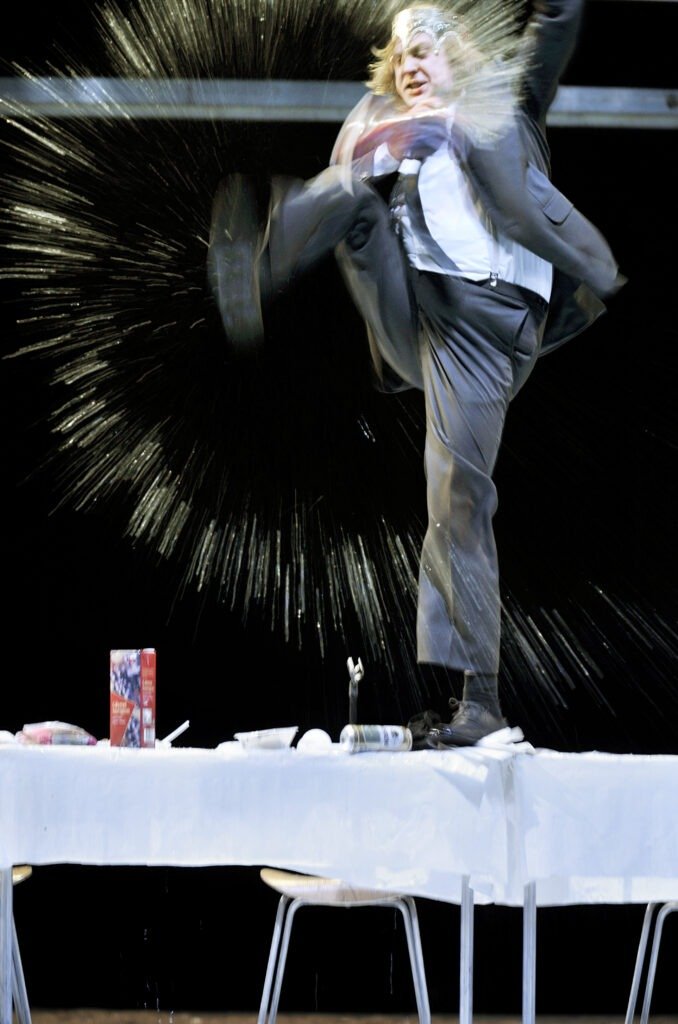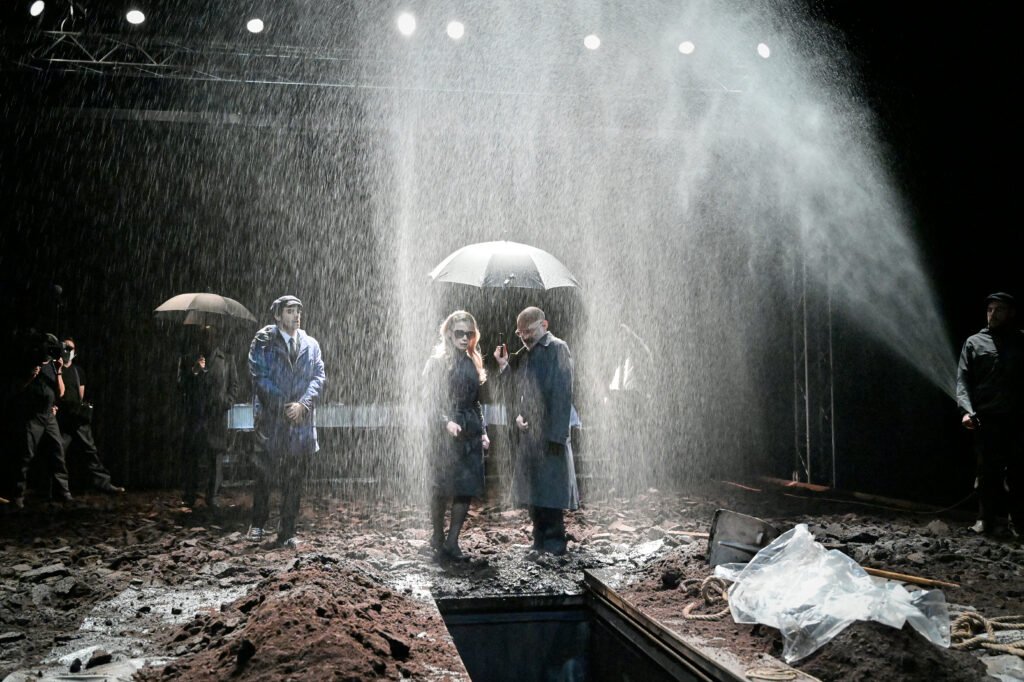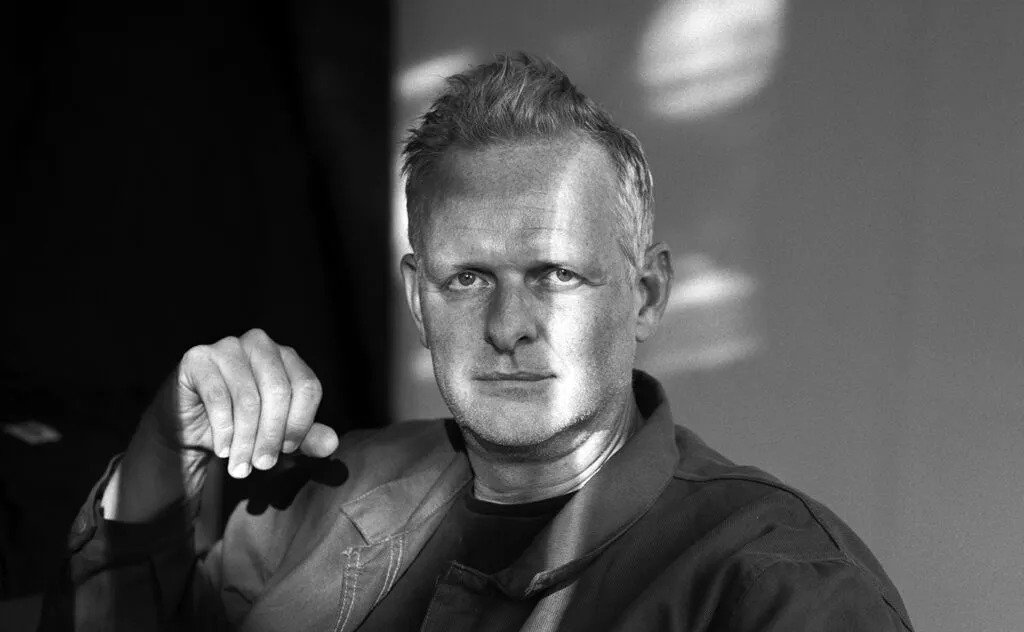If you have in mind another dull, slow-paced, and multi-faceted Shakespearean production, this ‘Hamlet’ will certainly prove you wrong.
Thomas Ostermeier has influenced contemporary European theatre like few others, deconstructing, reinterpreting, and incorporating classical works into the reality of today. His productions have travelled across the world, and in particular, his ‘Hamlet,’ a co-production of the Schaubühne with the Athens and Avignon Festivals that had its world premiere 15 years ago in the Greek capital, documents an international tour with over 30 stops in Europe, Asia, and the US.
Now, it’s Cyprus’s turn to get a taste of the iconic iconoclastic vision of the renowned German theatre director. Six actors, led by the famous Lars Eidinger, embody up to 20 characters, constantly changing roles with the start taking place in the rain and mud. It is one of the most emblematic and complex Shakespearean productions in the 21st century, on the occasion of which Ostermeier talks to Phileleftheros.
How would you describe your Hamlet? What are the main features of the character?
Hamlet is without a doubt one of the great iconic figures of theatre literature. But if you take a closer look at this character, you can discover that he is also a spoilt, naughty boy, desperate, narcissistic, eccentric, profound and playful. He has never really come to terms with the political intrigues at court. After the murder of his father, he feels compelled to act, is completely overwhelmed and flees into madness.
Why do you think (Hamlet) is (still) Shakespeare’s most popular hero?
For me, Hamlet has a lot to do with the question of play and reality. Hamlet pretends to be mad in order to escape the compulsion to act responsibly. Ultimately, it is almost impossible to say whether the feigned madness has become “real” after all. In Hamlet, Shakespeare’s theatre thematizes the process of acting itself. The theatre becomes its own subject. Perhaps this is why the text has fascinated theatre people for centuries. And then, of course, the title character is a role that is a huge challenge and opportunity for every actor.
How has the way audiences engage with Shakespeare shifted nowadays?
In many of his plays, Shakespeare depicts a dark world characterized by greed for power, betrayal and deception. The playful immersion in this cosmos always has a very peculiar attraction and is frightening and liberating at the same time. I don’t think the essence of this has changed for audiences over the centuries. The fascinating thing is that audiences of all ages recognize patterns of their respective presence in this cosmos in very different historical and social situations.

Would you say that the reasons that lead people to write or attend theatre have fundamentally changed since Shakespeare’s time?
I’m not a writer, but I think that in the past, as today, writers have an urgent need to engage with the world around them and perhaps even understand it a little better through the process of writing. For the audience, the communal experience in a theatre venue is certainly the decisive factor. This has probably not changed essentially over.
What do you admire most about Lars Eidinger’s portrayal of the Shakespearean hero?
I’ve been working with Lars Eidinger for a very long time. What has always fascinated me about this actor is that he makes himself available on stage without reservation and that he is ready to invest in everything. This relentless commitment gives him an intensity of performance that always draws on the moment, always seeking and finding direct communication with the audience.
What requirements do you consider necessary for a director to most effectively communicate the great classics to today’s audiences?
I am interested in classics not because they are classics, but because they ask the big questions. In my opinion, the challenge when staging classical plays is to look at them from a contemporary perspective without oversimplifying them. I think the crucial tool for making a historical text accessible to a contemporary audience is to really explore in depth the individual situations that the playwright creates.
Is imitating yourself necessarily a bad thing creatively?
Unfortunately, it is a common practice in the theatre for directors to develop a “signature”, an aesthetic “trademark” and then impose it on the plays and material they are staging. For me, it would be ideal to develop the artistic and aesthetic approach of a production from the material itself. Of course, there are some features that appear in new contexts from time to time, but I find frequent repetition of the tried and tested rather boring.

Does a boring production have a point and a reason to watch?
There is actually no reason to watch a boring evening at the theatre. Unless you take the opportunity to analyse why it is boring so that you can avoid these mistakes in future.
Can theatre really do something to alter or influence people’s behaviour?
I’m not naive enough to believe that theatre can make the world a better place. If you want to improve something in society, you have to get involved, become politically active, and protest on the streets. I also don’t believe that we as theatre people can give people answers to their urgent questions. We can’t explain the world. We do not know better. But we can raise questions together, play through different options in an enjoyable way, and explore extreme situations together. That is our opportunity and our task.
Have you finally concluded that if given different circumstances people would behave better?
To quote Brecht’s play “The Good Man of Szechuan”: “How can I be good when everything is so expensive?”. It’s probably not quite that simple. But we are already facing that social togetherness is very fragile and can be jeopardized very quickly when people come under the pressure of not knowing how to finance their lives.
What is the dominant trend in theatre today?
I would say there are perhaps roughly two rather negative trends at the moment. One is towards conventional, more commercial theatre with stars from film and television. And then a tendency towards a theatre of striking effects, in which the actors are no longer really at the centre. But there is also a rather positive tendency in theatre to give people and stories a platform on stage that would otherwise not be heard.
Are the boundaries of the theatrical avant-garde still under substantial exploration?
I think that every conceivable theatrical form is being tried out at the moment. There are projects with amateur actors, all kinds of sources are being turned into material on stage, and people are experimenting with virtual reality.
After all, is innovation and interest a desideratum for an artist?
I don’t think you can be an artist without a great deal of curiosity and attentive observation of the world around you, at least not in the theatre.
How do you interpret the new wave of neoconservatism affecting Europe?
This really is a frightening development. Unfortunately, it proves that in an increasingly confusing world, the simple answers of right-wing populist politicians are booming very easily.
Do you share the view that as humanity we are heading towards an eschatological verge?
At my age, I have already experienced a whole series of apocalyptic scenarios. But the climate crisis is a completely new kind of challenge. If humanity doesn’t radically rethink this very quickly, we are facing an inevitable, irreversible global catastrophe.
INFO: Hamlet from Schaubühne am Lehniner Platz to Nicosia International Festival, Municipal Theatre, December 14 – 8:30 p.m., December 15 – 6:30 p.m. (in German with surtitles in Greek and English)
(Featured image by Debora Mittelstaedt)






